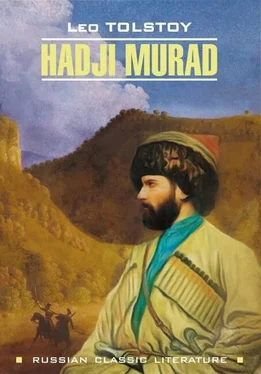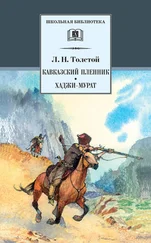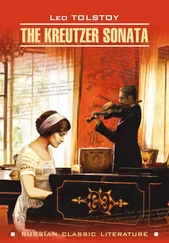“Umma Khan was slow of speech. He did not know how to reply and remained silent. Then I said that if this was so, Let Hamzad come to Khunzakh and the Khansha and the Khans would receive him with honor… . but I was not allowed to finish – and here I first encountered Shamil, who was beside the Imam. He said to me, Thou has not been asked… . It was the Khan!’
“I was silent, and Hamzad led Umma Khan into his tent. Afterwards Hamzad called me and ordered me to go to Kunzakh with his envoys. I went. The envoys began persuading the Khansha to send her eldest son also to Hamzad. I saw there was treachery and told her not to send him; but a woman has as much sense in her head as an egg has hair. She ordered her son to go. Abu Nutsal Khan did not wish to. Then she said, I see thou are afraid!’ Like a bee she knew where to sting him most painfully. Abu Nutsal Khan flushed and did not speak to her any more, but ordered his horse to be saddled. I went with him.
“Hamzad met us with even greater honor than he had shown Umma Khan. He himself rode out two rifle-shot lengths down the hill to meet us. A large party of horsemen with their banners followed him, and they too sang, shot, and caracoled.
“When we reached the camp, Hamzad led the Khan into his tent and I remained with the horses… .
“I was some way down the hiss when I heard shots fired in Hamzad’s tent. I ran there and saw Umma Khan lying prone in a pool of blood, and Abu Nutsal was fighting the murids. One of his cheeks had been hacked off and hung down. He supported it with one hand and with the other stabbed with his dagger at all who came near him. I saw him strike down Hamzad’s brother and aim a blow at another man, but then the murids fired at him and he fell.”
Hadji Murad stopped and his sunburnt face flushed a dark red and his eyes became bloodshot.
“I was seized with fear and ran away.”
“Really? … I thought thou never wast afraid,” said Loris-Melikov.
“Never after that… . Since then I have always remembered that shame, and when I recalled it I feared nothing!”
“But enough! It is time for me to pray,” said Hadji Murad drawing from an inner breast-pocket of his Circassian coat Vorontsov’s repeater watch and carefully pressing the spring. The repeater struck twelve and a quarter. Hadji Murad listened with his head on one side, repressing a childlike smile.
“Kunak Vorontsov’s present,” he said, smiling. “It is a good watch,” said Loris-Melikov. “Well then, to thou and pray, and I will wait.”
“Yakshi. Very well,” said Hadji Murad and went to his bedroom.
Left by himself, Loris-Melikov wrote down in his notebook the chief things Hadji Murad had related, and then lighting a cigarette began to pace up and down the room. On reaching the door opposite the bedroom he heard animated voices speaking rapidly in Tartar. He guessed that the speakers were Hadji Murad’s murids, and opening the door he went to them.
The room was impregnated with that special leathery acid smell peculiar to the mountaineers. On a burka spread out on the floor sat the one-eyed, red-haired Gamzalo, in a tattered greasy beshmet, plaiting a bridle. He was saying something excitedly, speaking in a hoarse voice, but when Loris-Melikov entered he immediately became silent and continued his work without paying any attention to him.
In front of Gamzalo stood the merry Khan Mahoma showing his white teeth, his black lashless eyes glittering, and saying something over and over again. The handsome Eldar, his sleeves turned up on his strong arms, was polishing the girths of a saddle suspended from a nail. Khanefi, the principal worker and manager of the household, was not there, he was cooking their dinner in the kitchen.
“What were you disputing about?” asked Loris-Melikov after greeting them.
“Why, he keeps on praising Shamil,” said Khan Mahoma giving his hand to Loris-Melikov. “He says Shamil is a great man, learned, holy, and a dzhigit.”
“How is it that he has left him and still praises him?”
“He has left him and still praises him,” repeated Khan Mahoma, his teeth showing and his eyes glittering.
“And does he really consider him a saint?” asked Loris-Melikov.
“If he were not a saint the people would not listen to him,” said Gamzalo rapidly.
“Shamil is no saint, but Mansur was!” replied Khan Mahoma. “He was a real saint. When he was Imam the people were quite different. He used to ride through the aouls and the people used to come out and kiss the him of his coat and confess their sins and vow to do no evil. Then all the people – so the old men say – lived like saints: not drinking, nor smoking, nor neglecting their prayers, and forgiving one another their sins even when blood had been spilt. If anyone then found money or anything, he tied it to a stake and set it up by the roadside. In those days God gave the people success in everything – not as now.”
“In the mountains they don’s smoke or drink now,” said Gamzalo.
“Your Shamil is a lamorey,” said Khan Mahoma, winking at Loris-Melikov. (Lamorey was a contemptuous term for a mountaineer.)
“Yes, lamorey means mountaineer,” replied Gamzalo. “It is in the mountains that the eagles dwell.”
“Smart fellow! Well hit!” said Khan Mahoma with a grin, pleased at his adversary’s apt retort.
Seeing the silver cigarette-case in Loris Melikov’s hand, Khan Mahoma asked for a cigarette, and when Loris=Melikov remarked that they were forbidden to smoke, he winded with one eye and jerking his head in the direction of Hadji Murad’s bedroom replied that they could do it as long as they were not seen. He at once began smoking – not inhaling – and pouting his red lips awkwardly as he blew out the smoke.
“That is wrong!” said Gamzalo severely, and left the room. Khan Mahoma winked in his direction, and while smoking asked Loris-Melikov where he could best buy a silk beshmet and a white cap.
“Why, has thou so much money?”
“I have enough,” replied Khan Mahoma with a wink.
“Ask him where he got the money,” said Eldar, turning his handsome smiling face towards Loris-Melikov.
“Oh, I won it!” said Khan Mahoma quickly, and related how while walking in Tiflis the day before he had come upon a group of men – Russians and Armenians – playing at orlyanka (a kind of heads-and-tails). the stake was a large one: three gold ;pieces and much silver. Khan Mahoma at once saw what the game consisted in, and jingling the coppers he had in his pocket he went up to the players and said he would stake the whole amount.
“How couldst thou do it? Hadst thou so much?” asked Loris-Melikov.
“I had only twelve kopecks,” said Khan Mahoma, grinning.
“But if thou hadst lost?”
“Why, this!” said Khan Mahoma pointing to his pistol.
“Wouldst thou have given that?”
“Give it indeed! I should have run away, and if anyone had tried to stop me I should have killed him – that’s all!”
“Well, and didst thou win?”
“Aye, I won it all and went away!”
Loris-Melikov quite understood what sort of men Khan Mahoma and Eldar were. Khan Mahoma was a merry fellow, careless and ready for any spree. He did not know what to do with his superfluous vitality. He was always gay and reckless, and played with his own and other people’s lives. For the sake of that sport with life he had now come over to the Russians, and for the same sport he might go back to Shamil tomorrow.
Eldar was also quite easy to understand. He was a man entirely devoted to his Murshid; calm, strong, and firm.
The red-haired Gamzalo was the only one Loris-Melikov did not understand. He saw that that man was not only loyal to Shamil but felt an insuperable aversion, contempt, repugnance, and hatred for all Russians, and Loris-Melikov could therefore not understand why he had come over to them. It occurred to him that, as some of the higher officials suspected, Hadji Murad’s surrender and his tales of hatred of Shamil might be false, and that perhaps he had surrendered only to spy out the Russians’ weak spots that, after escaping back to the mountains, he might be able to direct his forces accordingly. Gamzalo’s whole person strengthened this suspicion.
Читать дальше
Конец ознакомительного отрывка
Купить книгу












